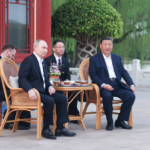KASHMIR’ has been and, in all probability, will remain India’s perpetual ‘work-in-progress’ in the foreseeable future. Lack of political imagination/will, both in New Delhi and Srinagar, has more to do with it than any of its other factors, including inherent volatility in the valley’s ground situation or the menacing Pakistan dimension of the festering problem.
For sure, the situation in the valley is worrisome. Unabated violence is adding to emotional alienation as the lines of communication between local rulers and the ruled as well as those between (political) Srinagar and New Delhi have broken down. Consequently, the security apparatus has to take more load than it is designed to sustain the desired minimum politico-constitutional equilibrium.
For this reason, even the redressal mechanism—judiciary—has been rendered almost dysfunctional. Near absence of rule of law and non-redressal of accumulated grievances aggravate alienation on the ground. Desperation is a natural consequence.
It is a vicious circle, trapping every organ of the State as much as the aggrieved local population. Periodic conflagration is endemic, with agonising dislocation of normal routine. Economy continues to be lashed by its toxic fallout.
Two inevitable inferences are—one, New Delhi is either clueless about tackling the deteriorating situation on the ground in Kashmir or it is just not interested in ‘wasting’ its time in exploring political means for dousing the fire; two, the NDA government’s thinking on ‘Kashmir’ has become hostage to (mis)perceived exigencies of its thorny external dimension involving Pakistan.
In any case, the mounting toll, in physical and emotional terms, is adding to the estrangement, particularly in the valley. The recent blood-stained ‘election’ in the Srinagar Lok Sabha constituency is a case in point. Eight persons were killed on the polling day that witnessed poorest ever (7 per cent) voter turnout, making its outcome a mockery and impelling cancellation of the polling in South Kashmir’s Anantnag parliamentary constituency vacated by Chief Minister Mehbooba Mufti—a grievous psychological setback in the crucial battle between the mainstream and separatists.
The range and depth of mass alienation can be gauged by the fact that not so long ago the voter turn-out in the 2014 Lok Sabha elections as well as in the subsequent State Assembly elections was between 50 and 70 per cent. Those who know and understand the objective ground reality will testify that political factors have much more to do with this slump in popular mood than the level of violence on the ground.
Yet, this very crucial factor either escapes the attention at the top or is deliberately ignored for doubtful reasons. The result is excessive thrust upon security (law and order) measures without supplementing the effort on the political front.
Ironically, this critical discrepancy has been pointed out, time and again, by the top Army brass in the state. The then Northern Army Commander Lt Gen DS Hooda went public more than once to exhort that channels of communications be restored with ‘all political stakeholders’. He left no one in doubt about how the ground situation is perceived from within the security apparatus that is, unfairly, left to take the brunt all by itself. Even after their retirement, Lt Gen Hooda as also former Srinagar-based Chinar Corps commander (R) Lt Gen Subrata Saha have been exhorting all concerned to return to the path of debate.
Similar voices emanating from political quarters here and in rest of the country have so far got lost in wilderness, even as the deteriorating ground situation continues to take its heavy toll.
The mainstream political class in the valley finds itself squeezed into a corner and rendered pathetically clueless.At the grassroot level, their political workers are preoccupied with their families’ physical safety. The situation has taken a full turn from where it was till a year or so after the 2014 general elections when the mainstream appeared to be having an upper hand in steering the course of events. Today they find it safer to be led by the course of unfavourable events on the ground rather than leading. As of now, they are stranded and left with Hobson’s choice.
The worst casualty is the ruling PDP whose Agenda of Alliance (AoA) with the coalition partner, BJP, has been reduced to an object of ridicule and contempt because the partners have not moved even an inch in implementing it during the past two-and-a-half years of their stipulated 6-year tenure. It has lost sanctity, if ever it had any. Consequently, the PDP’s public image has taken a beating on its supposed bastion, rendering it politically handicapped. Worse, its credibility on its home ground is mud today. That factor also explains the higher intensity of violence in South Kashmir compared to rest of the troubled valley.

It is an irony of the situation today that, contrary to logical consequence of sharp decline in the PDP’s political fortunes, its main rival in the arena, National Conference also finds itself sharing the same doghouse. That is primarily because the mainstream politics on the whole has become stinky and acquired an abominable image on the ground.
The only course out of this messy situation is that the NDA government pauses for a while, takes a cool look at its strategy and tactics of ‘dealing’ with the country’s only Muslim majority state with accumulated heavy historical baggage. To start with, let the coalition leadership, particularly the BJP, revisit its tacit commitment made in the AoA for running the seemingly incompatible arrangement in J&K.
That commitment made to the people needs to be honoured, or at least shown some respect. Dialogue with stakeholders, including the Hurriyat and, at a different level, with Pakistan, is a key element of that approach. So are other issues of key political significance.
If the internal dimension of India’s Kashmir problem has worsened over the past few years, New Delhi’s failure to honour its commitment (AoA) has much to do with it. And, if Pakistan has been able to find greater space to foment trouble on this side of the LoC, New Delhi must accept its share of the blame (ignoring the commitment made at the time of going into alliance). To be fair, NDA alone is not at fault.
Preceding two UPA governments had done no better. Manmohan Singh’s Round Table on Kashmir and its five Working Groups had generated hopes and expectations, only to be drowned in the inexplicable apathy of the UPA leadership in following up their recommendations.
TODAY there is across-the-board lack of credibility. ‘They have no intention to undo the injustices done to us,’ is the understandable common refrain in Kashmir. Result is that when ordinary people come forward to face life-threatening odds and participate in the national democratic exercise, their participation is momentarily hailed loudly but its corresponding obligation is soon forgotten or, as is locally suspected, deliberately ignored.
Trust deficit is its inevitable consequence. And that is playing havoc with occasional, feeble attempts to ‘win hearts and minds’. More than once, the people have shown their willingness to trust the ‘other side’ but without any reciprocal gesture.
This attitude has to change, unless, of course, ‘affinity of (basic) ideals’, underlying the country’s only Muslim-majority state’s voluntary accession with the Indian Union, against (communal) run of events in 1947, is sought to be jettisoned for some doubtful coercive ideological supremacy.
Let the security apparatus do its job as it had been doing so efficiently and so effectively all through the two general elections. Listen to the considered opinion of (former) senior Army commanders and act upon their exhortation. They, more than anyone else, understand ‘Kashmir’ and its nuances.
The writer is a veteran journalist with vast knowledge and experience in reporting, commenting and analyzing political matters. Known for authentic interpretation of the complex Kashmir situation. Former executive editor of the SUNDAY OBSERVER and ex-Director Information & PR J&K Govt (on contract with Sheikh Abdullah govt). Experience in reporting/ analyzing political and electoral matters across several states, including U.P & West Bengal


























































